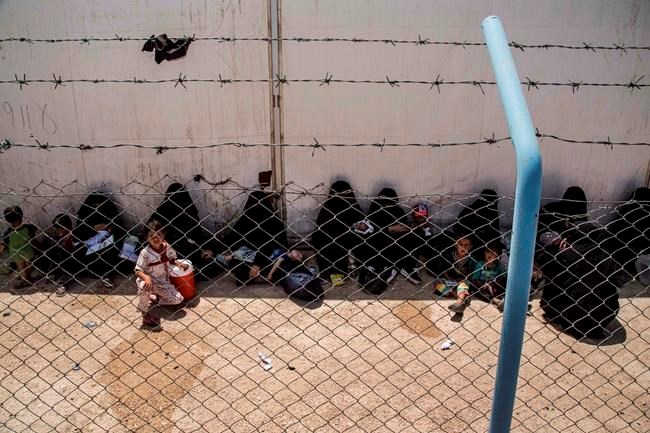OTTAWA — The federal government has been accused of violating its international human-rights obligations by refusing to help dozens of Canadian men, women and children detained in squalid camps in Syria because of their suspected links to the Islamic State.
The accusation by New York-based Human Rights Watch is in a scathing report released Monday that calls on Ottawa to immediately begin bringing the detainees home — starting with the 26 Canadian children known to be in the camps.
One of those children is a five-year-old orphan known as Amira who was found on the side of a road last year after her parents and siblings were killed in an airstrike and whose case has been raised with the federal Liberal government in the past.
"The government of Canada is flouting its international human rights obligations toward Canadians who are arbitrarily detained in northeast Syria," reads the 92-page report, which included interviews with detainees, families and Canadian and foreign officials.
"The obligations that Canada has breached include taking necessary and reasonable steps to assist nationals abroad facing serious abuses including risks to life, torture, and inhuman and degrading treatment."
It goes on to paint a disturbing picture of conditions in the camps, with food and clean water in short supply while disease and violence are rife. Children were seen drinking worm-infested water while "morality police" hunted women who criticized ISIL.
The Human Rights Watch report is the latest to take aim at the federal government when it comes to Canadians detained in northeastern Syria following the collapse of the Islamic State of Iraq and the Levant.
Prime Minister Justin Trudeau repeatedly defended his government's largely hands-off approach on Monday as he noted Canada does not have diplomats on the ground in Syria and emphasized the safety concerns associated with sending officials to the area.
"We have a responsibility as a government to ensure that Canadian citizens, particularly employees, are not put into danger, are not exposed to grave situations," Trudeau said during his daily news conference outside his Ottawa home.
"Syria is an area where we do not have any diplomats or any Canadians on the ground and therefore we work through intermediaries to try and provide consular assistance as best we can."
Yet Human Rights Watch noted Britain, Denmark, Finland, France, Germany, Norway and the United States had all repatriated children, and in some cases their mothers, since October. That included 10 French orphans and children in June.
The federal government also recently helped 40,000 Canadians return home due to the COVID-19 pandemic, the organization said, including 29 from Syria. The 47 known Canadians in the Syrian detainee camps include eight men, 13 women and 26 children.
"Although Canadian authorities do not cite potential political fallout as a reason, in 2017 Trudeau faced a backlash simply for supporting rehabilitation programs for Canadian (ISIL) suspects who return home," the rights group wrote.
"To be sure, the repatriations are not always popular," it added, noting an attempt to repatriate a Norwegian mother and child led to the collapse of that country's government. "But the vast majority of repatriations have taken place with little or no controversy."
The Canadian detainees in the camps administered by Kurdish-led organization include Mohammed Khalifa, who has been described as an ISIL propagandist, and Jack Letts, a dual British-Canadian national dubbed "Jihadi Jack" by British media.
The British government revoked Letts's citizenship last year. Neither the Liberal government nor the official Opposition Conservatives have expressed enthusiasm for returning him to Canada despite repeated pleas from his family.
Human Rights Watch argued for repatriation as the best — and potentially only — way to hold Canadian ISIL members to account as there is no process in Syria to investigate and prosecute those suspected of crimes.
"None of the Canadians has been charged with any crime," it added. "Nor have the Canadians been brought before a judge to review the legality and necessity of their detention, making their continuing captivity arbitrary and unlawful."
At the same time, the group raised the question of whether Canadian authorities are withholding or limiting consular assistance from those in the camps because of their suspected links to ISIL, which it says would also violate international law.
Trudeau repeatedly sidestepped questions Monday about whether the government's reluctance to intervene is because the Canadians in the camps were linked to ISIL, but did at one point note the potential for investigations and prosecution.
"We recognize that we need to try and help all Canadians," he said, before adding: "It is more complicated when we talk about the fact that a number of these people could face charges when they return to Canada, for their activities linked to terrorism."
An annual federal report on extremism last year said some 190 people with connections to Canada are suspected of terrorist activity abroad and, in addition, approximately 60 had returned.
A small number of the 60 returnees had come back from Turkey, Iraq or Syria but many who remain abroad were said to lack valid travel documents, find themselves on a no-fly list or fear being arrested on Canadian soil.
This report by The Canadian Press was first published on June 29, 2020.
Lee Berthiaume, The Canadian Press



